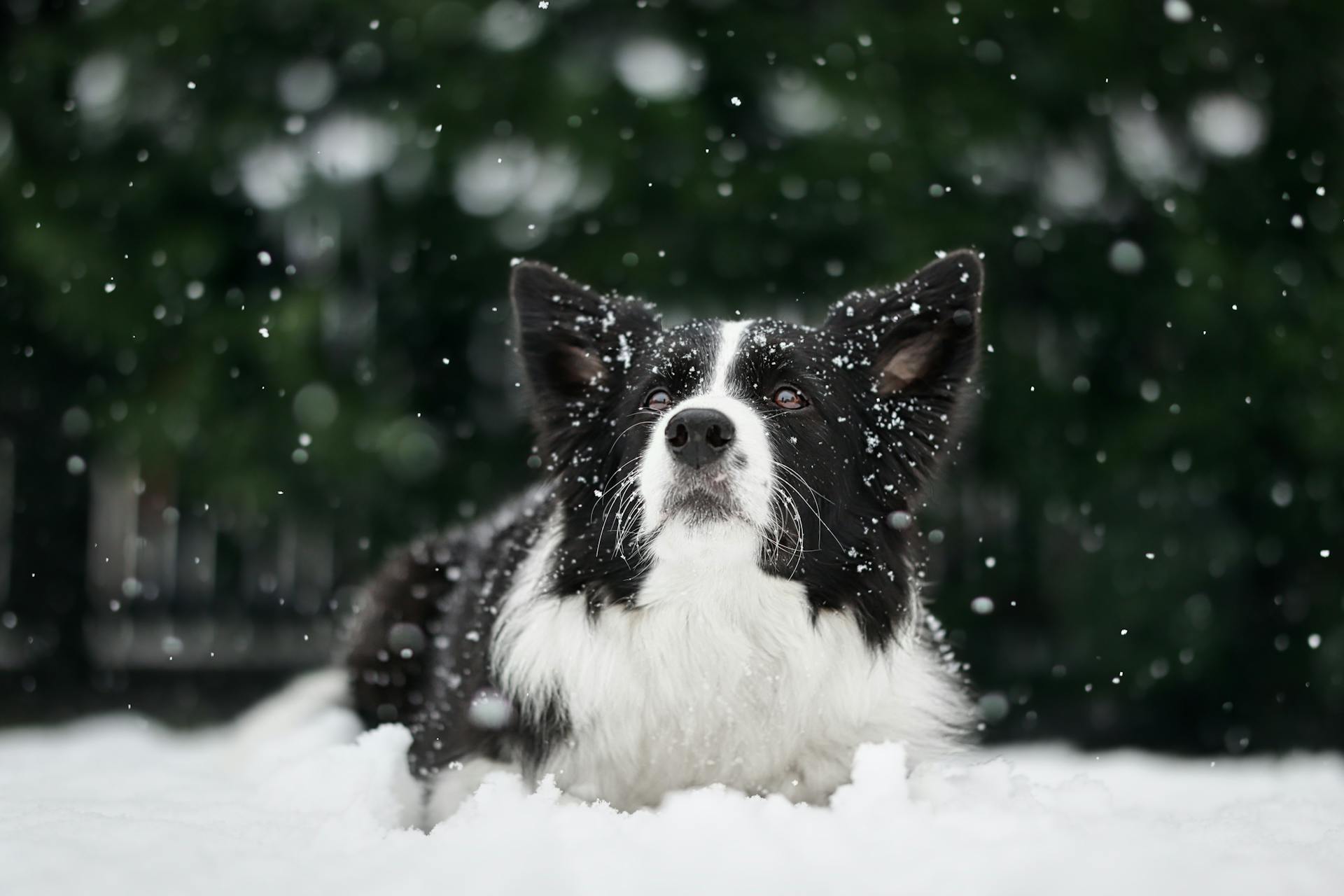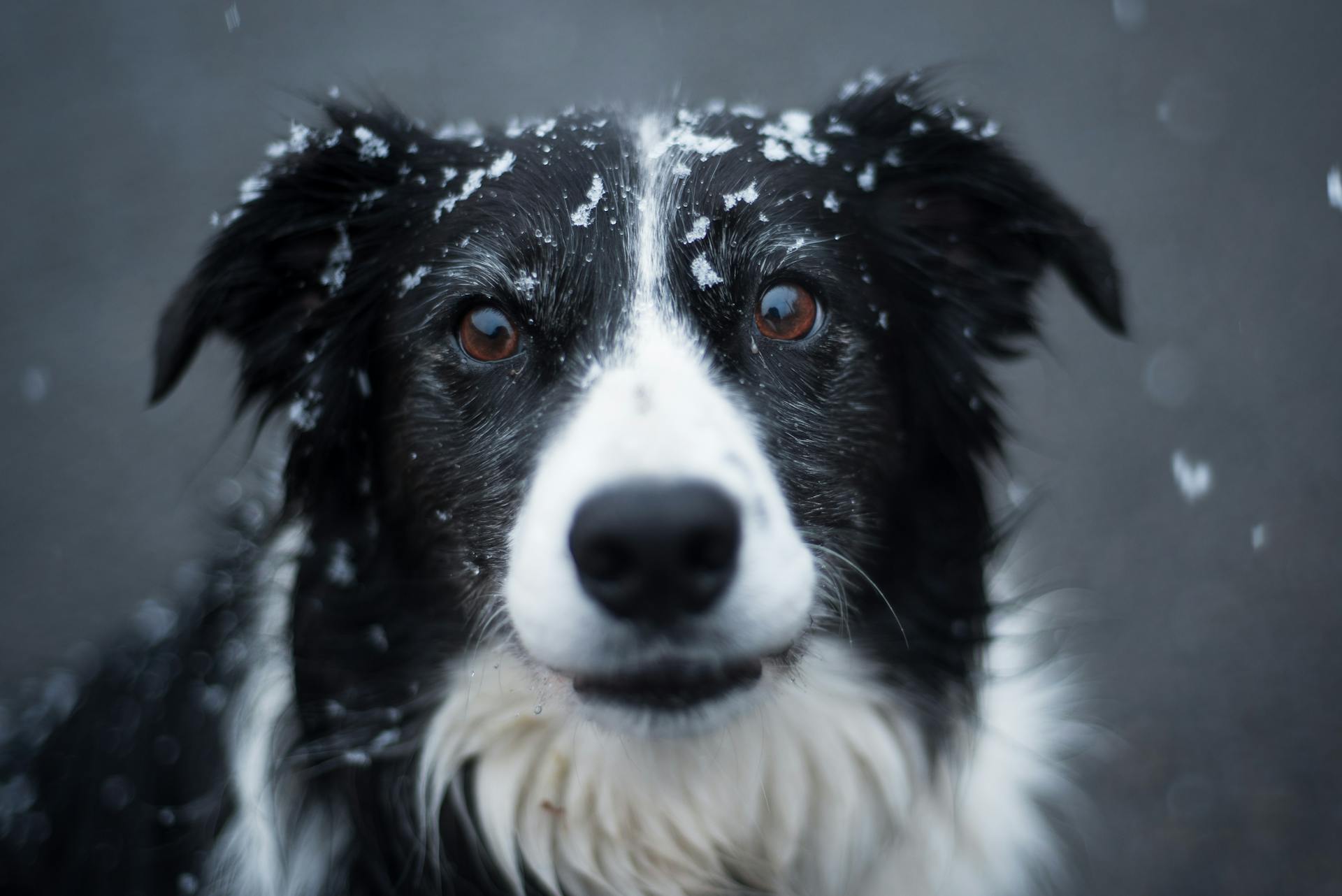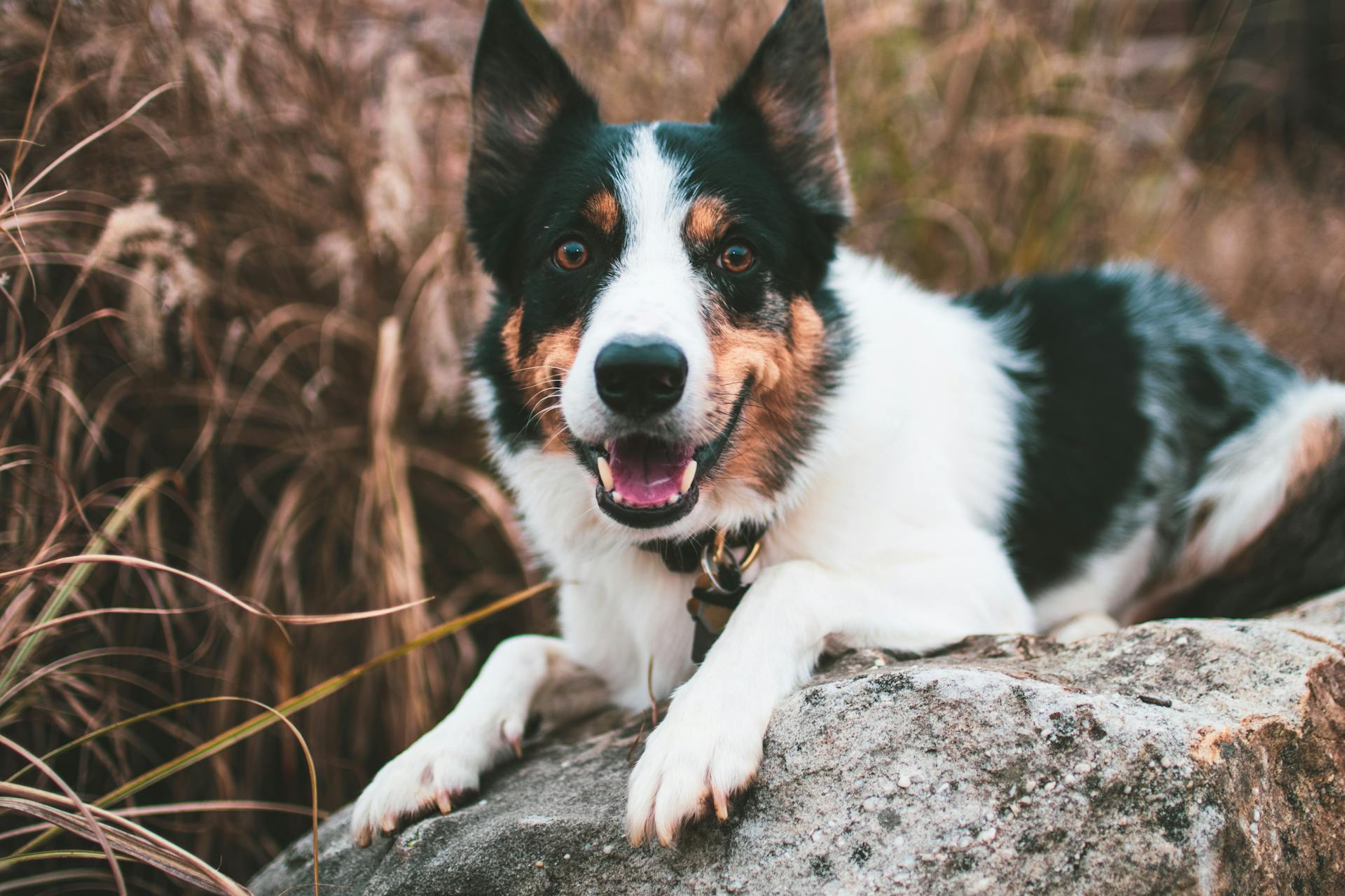
Border Collies are highly intelligent and energetic dogs that can make great companions for many families. They're known for their strong herding instincts, which can sometimes be misdirected towards chickens.
Border Collies are naturally inclined to chase small animals, including chickens, due to their herding background. This instinct can be difficult to overcome, especially if they're not properly socialized and trained.
While some Border Collies may get along with chickens, it's essential to remember that every dog is unique and may have its own personality. If you're considering getting a Border Collies and chickens together, it's crucial to start with a young puppy and introduce them to the chickens gradually and under close supervision.
Recommended read: Border Collies Herding Sheep
Preparing Your Dog
Before introducing a Border Collie to your backyard chickens, it's essential to prepare your dog for a harmonious coexistence.
Border Collies are naturally herding dogs, and their strong prey drive can be a challenge when it comes to chickens.
To prevent any potential conflicts, it's crucial to socialize your Border Collie to chickens from an early age, ideally starting from 8-10 weeks old.
This early socialization will help your dog develop a calm and gentle attitude towards the chickens, reducing the risk of chasing or harming them.
However, even with proper socialization, it's still possible for your Border Collie to develop strong instincts to herd the chickens, which may lead to problems.
Train Your Dog
Training your dog is a crucial step in preparing them for life with chickens. Collies are notoriously intelligent dogs that can learn new commands and follow orders with ease.
The 'leave it' command is a great place to start. This command can be taught by placing a treat in your open hand and saying 'leave it' when your dog tries to take it. You can then reward them with a treat from your other hand.
Once your dog has mastered the 'leave it' command, you can start introducing them to your chickens. Keep the chickens in their chicken run at first, so your dog can get used to their presence without direct contact. This will help your dog learn to respect the chickens' boundaries.
As your dog becomes more confident, you can try the 'leave it' command with them on a lead, using your chickens instead of treats. Remember to reward your dog for responding to the command and staying calm.
It's also essential to make sure your dog always responds to you when called, especially if they get too friendly with the chickens. This will help you regain control if needed.
Here are some key tips to keep in mind when training your dog:
- The 'leave it' command should be taught with a treat in your open hand, then on the ground, and eventually without any treats.
- Start by introducing your dog to your chickens in a controlled environment, such as their chicken run.
- Use your chickens as a distraction instead of treats when practicing the 'leave it' command on a lead.
- Always reward your dog for responding to the 'leave it' command and staying calm.
- Make sure your dog responds to you when called, especially if they get too friendly with the chickens.
Start Small On-Leash
When introducing your dog to chickens, start with a calm and controlled environment. Begin with a few of your most laid-back chickens that are already comfortable with being herded.
Start with a short distance, around two feet away, to give everyone time to get used to each other. Give your pup the 'walk-up' command and let him take the lead.
Your dog should be on a leash at this point to maintain control. Use both verbal and whistle commands to move the flock around and keep things interesting.
As you work through the different commands, remember to give your pup time to sit and process what's happening. This will help him stay focused and build trust with the chickens.
Readers also liked: Are Border Collies Good for First Time Owners
Choosing the Right Breeds
Border Collies are often considered a good match for families with chickens due to their high energy levels and herding instincts.
If you're considering getting a Border Collie, it's essential to remember that they require plenty of exercise and mental stimulation to prevent boredom and destructive behavior.
Some breeds, like the Australian Cattle Dog and the Kelpie, also have strong herding instincts and may get along well with chickens.
However, breeds like the Cavalier King Charles Spaniel and the Basset Hound tend to be more laid-back and may not be as interested in chasing chickens.
Ultimately, the right breed for you will depend on your lifestyle and the needs of your chickens.
Check this out: Border Collies Herd Ducks
Encouraging Positive Interaction
Encouraging positive interaction with chickens requires dedication and a constant watchful eye. You'll need to start from an early age to socialize your border collie with chickens, especially if they have a high prey drive.
Socialization between high-prey drive dogs and chickens is usually more successful when starting from an early age. This means that if you're getting a new border collie puppy, you can start introducing them to chickens right away.
Check this out: Are Border Collies High Maintenance

Begin introductions by holding your dog in a sit position while having someone trusted hold a chicken. Have the person holding the chicken advance, rewarding your dog with praise and treat rewards for remaining calm.
As your dog remains calm, you can gradually increase the time allowed for interaction. This will help them get used to the presence of chickens.
The biggest obstacle dog owners face when encouraging a positive interaction with chickens is that it's a technique that works best with young puppies experiencing chickens for the first time. Adjusting to life with chickens can be challenging for older dogs with a high prey drive, no matter how positive an interaction you create.
Here's a step-by-step guide to introducing your border collie to chickens:
- Begin introductions by holding your dog in a sit position while having someone trusted hold a chicken.
- Have the person holding the chicken advance, rewarding your dog with praise and treat rewards for remaining calm.
- Once your dog remains calm, allow them to sniff the chicken and offer a reward for a calm interaction.
- Over time, as your dog displays calm behavior, increase the time you allow your dog to interact with the chicken.
Understanding Compatibility
Border Collies are naturally herding dogs, which means they have an innate instinct to chase and gather animals, including chickens.
In fact, a study found that Border Collies have a strong prey drive and are prone to chasing small animals, including chickens, if they're not properly trained and socialized.
However, some Border Collies can learn to live with chickens if they're introduced to them at a young age and taught to respect their space.
According to experts, a Border Collie's success with chickens depends on its individual temperament and energy level.
A high-energy Border Collie may not be the best fit for a household with chickens, as it may view them as playthings or prey.
On the other hand, a calm and gentle Border Collie may be able to peacefully coexist with chickens.
It's also worth noting that some Border Collies may develop a strong bond with chickens, much like they would with other dogs.
See what others are reading: Are Border Collies High Energy
Frequently Asked Questions
What dog is best with chickens?
For families with chickens, the Great Pyrenees and the Kuvasz are excellent breeds to consider, as they are naturally protective of their territory and have a strong instinct to guard against predators. However, proper training and socialization are crucial to ensure they don't harm the chickens.
Sources
- https://www.bhg.com.au/australian-dog-breeds-that-wont-kill-chickens
- https://www.eggshellonline.co.uk/229-2
- https://wagwalking.com/training/train-a-border-collie-to-herd-chickens
- https://www.dogster.com/lifestyle/keeping-dogs-and-chickens-together
- https://spotonfence.com/blogs/training-tips/dog-killing-chickens
Featured Images: pexels.com


